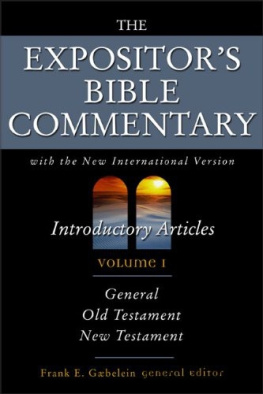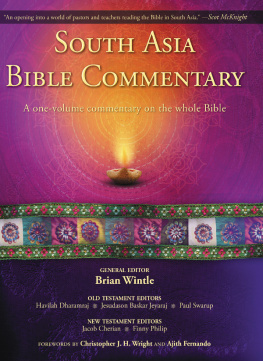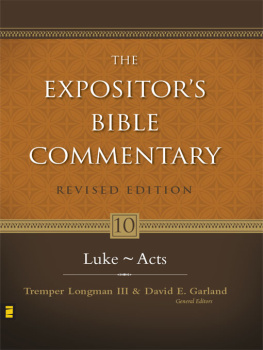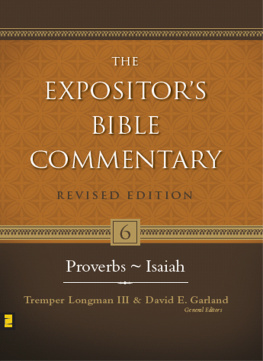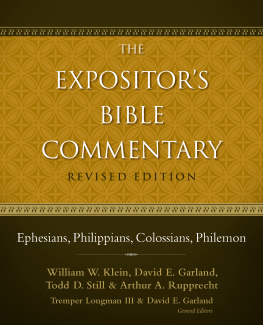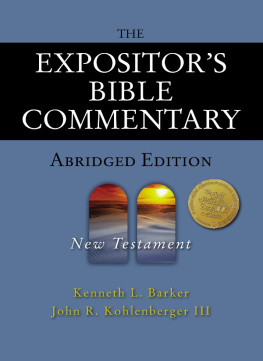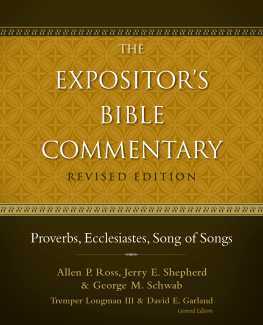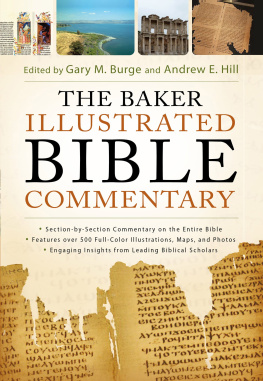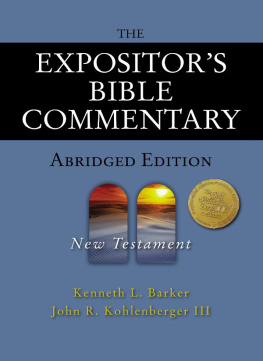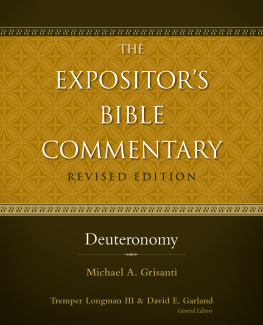Frank E. Gabelein - The Expositor’s Bible Commentary, Vol. 1: Introductory Articles
Here you can read online Frank E. Gabelein - The Expositor’s Bible Commentary, Vol. 1: Introductory Articles full text of the book (entire story) in english for free. Download pdf and epub, get meaning, cover and reviews about this ebook. year: 0, genre: Religion. Description of the work, (preface) as well as reviews are available. Best literature library LitArk.com created for fans of good reading and offers a wide selection of genres:
Romance novel
Science fiction
Adventure
Detective
Science
History
Home and family
Prose
Art
Politics
Computer
Non-fiction
Religion
Business
Children
Humor
Choose a favorite category and find really read worthwhile books. Enjoy immersion in the world of imagination, feel the emotions of the characters or learn something new for yourself, make an fascinating discovery.
- Book:The Expositor’s Bible Commentary, Vol. 1: Introductory Articles
- Author:
- Genre:
- Year:0
- Rating:5 / 5
- Favourites:Add to favourites
- Your mark:
- 100
- 1
- 2
- 3
- 4
- 5
The Expositor’s Bible Commentary, Vol. 1: Introductory Articles: summary, description and annotation
We offer to read an annotation, description, summary or preface (depends on what the author of the book "The Expositor’s Bible Commentary, Vol. 1: Introductory Articles" wrote himself). If you haven't found the necessary information about the book — write in the comments, we will try to find it.
The Expositor’s Bible Commentary, Vol. 1: Introductory Articles — read online for free the complete book (whole text) full work
Below is the text of the book, divided by pages. System saving the place of the last page read, allows you to conveniently read the book "The Expositor’s Bible Commentary, Vol. 1: Introductory Articles" online for free, without having to search again every time where you left off. Put a bookmark, and you can go to the page where you finished reading at any time.
Font size:
Interval:
Bookmark:
The Expositor's Bible Commentary
INTRODUCTORY
ARTICLES
Frank E. Gaebelein General Editor
Preface
The title of this work defines its purpose. Written primarily by expositors for expositors, it aims to provide preachers, teachers, and students of the Bible with a new and comprehensive commentary on the books of the Old and New Testaments. Its stance is that of a scholarly evangelicalism committed to the divine inspiration, complete trustworthiness, and full authority of the Bible. Its seventy-eight contributors come from the United States, Canada, England, Scotland, Australia, New Zealand, and Switzerland, and from various religious groups, including Anglican, Baptist, Brethren, Free, Independent, Methodist, Nazarene, Presbyterian, and Reformed churches. Most of them teach at colleges, universities, or theological seminaries.
No book has been more closely studied over a longer period of time than the Bible. From the Midrashic commentaries going back to the period of Ezra, through parts of the Dead Sea Scrolls and the Patristic literature, and on to the present, the Scriptures have been expounded. Indeed, there have been times when, as in the Reformation and on occasions since then, exposition has been at the cutting edge of Christian advance. Luther was a powerful exegete, and Calvin is still called "the prince of expositors."
Their successors have been many. And now, when the flood of new translations and their unparalleled circulation have expanded the readership of the Bible, the need for exposition takes on fresh urgency.
Not that God's Word can ever become captive to its expositors. Among all other books, it stands first in its combination of perspicuity and profundity. Though a child can be made "wise for salvation" by believing its witness to Christ, the greatest mind cannot plumb the depths of its truth (2 Tim. 3:15; Rom. 1 1:33). As Gregory the Great said, "Holy Scripture is a stream of running water, where alike the elephant may swim, and the lamb walk." So, because of the inexhaustible nature of Scripture, the task of opening up its meaning is still a perennial obligation of biblical scholarship.
How that task is done inevitably reflects the outlook of those engaged in it. Every biblical scholar has presuppositions. To this neither the editors of these volumes nor the contributors to them are exceptions. They share a common commitment to the supernatural Christianity set forth in the inspired Word. Their purpose is not to supplant the many valuable commentaries that have preceded this work and from which both the editors and contributors have learned. It is rather to draw on the resources of contemporary evangelical scholarship in producing a new reference work for understanding the Scriptures.
A commentary that will continue to be useful through the years should handle contemporary trends in biblical studies in such a way as to avoid becoming outdated when critical fashions change. Biblical criticism is not in itself inadmissible, as some have mistakenly thought. When scholars investigate the authorship, date, literary characteristics, and purpose of a biblical document, they are practicing biblical criticism. So also when, in order to ascertain as nearly as possible the original form of the text, they deal with variant readings, scribal errors, emendations, and other phenomena in the manuscripts. To do these things is essential to responsible exegesis and exposition. And always there is the need to distinguish hypothesis from fact, conjecture from truth.
The chief principle of interpretation followed in this commentary is the grammatico-historical one--namely, that the primary aim of the exegete is to make clear the meaning of the text at the time and in the circumstances of its writing. This endeavor to understand what in the first instance the inspired writers actually said must not be confused with an inflexible literalism. Scripture makes lavish use of symbols and figures of speech; great portions of it are poetical. Yet when it speaks in this way, it speaks no less truly than it does in its historical and doctrinal portions. To understand its message requires attention to matters of grammar and syntax, word meanings, idioms, and literary forms-a 11 in relation to the historical and cultural setting of the text.
The contributors to this work necessarily reflect varying convictions. In certain controversial matters the policy is that of clear statement of the contributors' own views followed by fair presentation of other ones. The treatment of eschatology, though it reflects differences of interpretation, is consistent with a general premillennial position. (Not all contributors, however, are premillennial.) But prophecy is more than prediction, and so this commentary gives due recognition to the major lode of godly social concern in the prophetic writings.
The Expositor's Bible Commentary is presented as a scholarly work, though not primarily one of technical criticism. In its main portion, the Exposition, and in Volume 1 (General and Special Articles), all Semitic and Greek words are transliterated and the English equivalents given. As for the Notes, here Semitic and Greek characters are used but always with transliterations and English meanings, so that this portion of the commentary will be as accessible as possible to readers unacquainted with the original languages.
It is the conviction of the general editor, shared by his colleagues in the Zondervan editorial department, that in writing about the Bible, lucidity is not incompatible with scholarship. They are therefore endeavoring to make this a clear and under- standable work.
The translation used in it is the New International Version (North American Edition). To the International Bible Society thanks are due for permission to use this most recent of the major Bible translations. The editors and publisher have chosen it because of the clarity and beauty of its style and its faithfulness to the original texts.
To the associate editor, Dr. J. D. Douglas, and to the contributing editorsDr. Walter C. Kaiser, Jr. and Dr. Bruce K. Waltke for the Old Testament, and Dr. James Montgomery Boice and Dr. Merrill C. Tenney for the New Testamentthe general editor expresses his gratitude fortheir unfailing cooperation and their generosity in advising him out of their expert scholarship. And to the many other contributors he is indebted fortheir invaluable part in this work. Finally, he owes a special debt of gratitude to Dr. Robert K. DeVries, executive vice-president of the Zondervan Publishing House; Rev. Gerard Terpstra, manuscript editor; and Miss Elizabeth Brown, secretary to Dr. DeVries, fortheir continual assistance and encouragement.
Whatever else it isthe greatest and most beautiful of books, the primary source of law and morality, the fountain of wisdom, and the infallible guide to lifethe Bible is above all the inspired witness to Jesus Christ. May this work fulfill its function of expounding the Scriptures with grace and clarity, so that its users may find that both Old and New Testaments do indeed lead to our Lord Jesus Christ, who alone could say, "I have come that they may have life, and have it to the full" (John 10:10).
Frank E. Gaebelein
General Articles
The Authority and Inspiration of the Bible
Carl F.H. Henry
- B., A.M., Wheaton College; B.D., Th.D., Northern Baptist Theological Seminary; Ph.D., Boston University, Litt.D., Seattle Pacific College; Litt.D., Wheaton College; L.H.D., Houghton College Lecturer-at-Large, World Vision International
- Introduction
- The Authority of the Bible
- God's Word as Rationally Intelligible
- God's Word as Dynamically Vital
- God's Word as Deliberately Written
- The Inspiration of the Bible
- Does God Speak to Man?
Font size:
Interval:
Bookmark:
Similar books «The Expositor’s Bible Commentary, Vol. 1: Introductory Articles»
Look at similar books to The Expositor’s Bible Commentary, Vol. 1: Introductory Articles. We have selected literature similar in name and meaning in the hope of providing readers with more options to find new, interesting, not yet read works.
Discussion, reviews of the book The Expositor’s Bible Commentary, Vol. 1: Introductory Articles and just readers' own opinions. Leave your comments, write what you think about the work, its meaning or the main characters. Specify what exactly you liked and what you didn't like, and why you think so.

